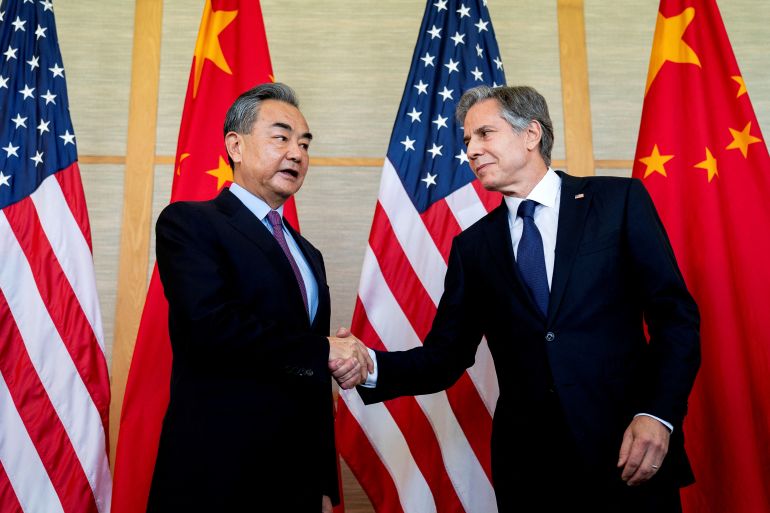US’s Blinken raises China’s ‘alignment with Russia’ on Ukraine
US Secretary of State tells reporters he told Chinese Foreign Minister Wang Yi that Beijing was not acting ‘neutral’ on Ukraine and is helping amplify ‘Russian propaganda’.

United States Secretary of State Antony Blinken said he had discussed Russia’s invasion of Ukraine with Chinese Foreign Minister Wang Yi and raised concerns about Beijing’s alignment with Moscow.
Both diplomats described their in-person talks on Saturday – which lasted for five hours – as “candid”, with their meeting taking place a day after they attended a gathering of G20 foreign ministers on the Indonesian island of Bali.
Keep reading
list of 4 itemsUS, China talk trade, supply chains as Biden weighs tariff cuts
Russia pockets $24bn from selling energy to China, India
China blasts US, British intelligence services over spying claims
“Despite the complexities of our relationship, I can say with some confidence that our delegations found today’s discussions useful, candid and constructive,” Blinken said.
“I shared again with the state councillor that we are concerned about the PRC’s alignment with Russia,” Blinken said.
Blinken said he did not think China was behaving in a neutral way as it had supported Russia in the United Nations and “amplified Russian propaganda”, he said.

“The relationship between the United States and China is highly consequential for our countries but also for the world. We are committed to managing this relationship, this competition, responsibly,” he said, promising to keep open channels of diplomacy with Beijing
After the meeting, a US official said “neither side held back” during the talks.
“We were very open about where our differences are … but the meeting was also constructive because, despite the candour, the tone was very professional,” the official said.
Blinken said Chinese President Xi Jinping had made it clear in a call with President Vladimir Putin on June 13 that he stood by a decision to form a partnership with Russia.
Shortly before Russia’s February 24 invasion of Ukraine, Beijing and Moscow announced a “no limits” partnership, although US officials say they have not seen China evade tough US-led sanctions on Russia or provide it with military equipment.
US officials have warned of consequences, including sanctions, should China offer material support for the war that Moscow calls a “special military operation” to degrade the Ukrainian military. Kyiv and its Western allies have said the invasion is an unprovoked land grab.
Blinken said he also stressed US concerns with China’s “increasingly provocative rhetoric and activity near Taiwan and the vital importance of maintaining peace and stability across the Taiwan Strait”.
He added that he had also raised human rights concerns regarding minorities in Tibet and in the western Xinjiang region.
‘Dialogue is constructive’
China’s foreign ministry said in a statement that the two sides had broadly agreed to work to improve ties, but also reeled off a laundry list of grievances against Washington, accusing the United States of “smearing and attacking” China’s political system.
Wang refuted some “erroneous US views” on Xinjiang, Hong Kong and the South China Sea, the ministry said in a statement.
Wang also called on the US to lift tariffs on imports from China as soon as possible, stop interfering in his country’s internal affairs and refrain from harming its interests in the name of human rights and democracy.
“Both sides believe that this dialogue is substantive and constructive, which will help enhance mutual understanding, reduce misunderstandings and misjudgements, and accumulate conditions for future high-level exchanges between the two countries,” it added.
US officials said before the talks that the meeting was aimed at keeping US-China relations stable and preventing them from veering inadvertently into conflict.
The United States has called China its main strategic rival and has been concerned it might one day attempt to take over the self-ruled democratic island of Taiwan.
Despite their rivalry, the world’s two largest economies remain major trading partners. The Biden administration is widely expected soon to ease some of Trump’s tariffs on Chinese goods, a move that could ease soaring inflation, which has become a major political liability in America.
Asked about his refusal to hold talks with Russian Foreign Minister Sergey Lavrov at the G20, Blinken said Washington saw “no signs” of Russia engaging with G20 diplomats over its invasion of Ukraine.
A day earlier, Foreign Minister Lavrov stormed out of talks with other G20 foreign ministers meeting in Indonesia as Western powers criticised Moscow for its invasion of Ukraine.